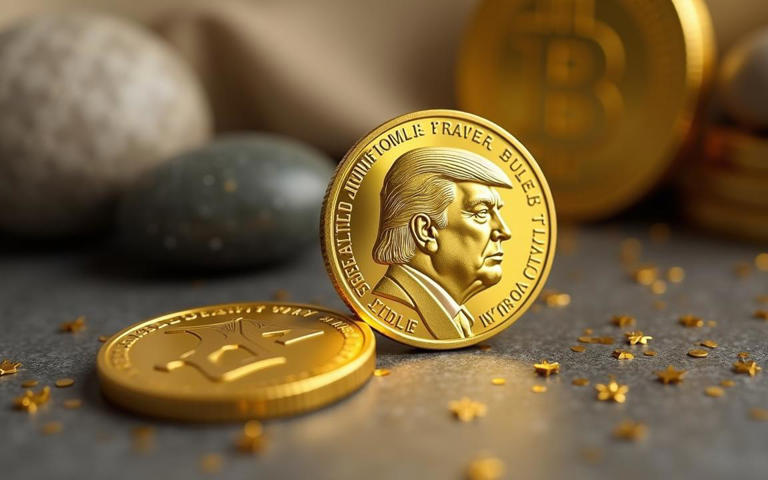In a move that blurs the lines between political campaigning, personal branding, and crypto culture, former President Donald Trump has unleashed a wave of excitement—and scrutiny—with his $TRUMP meme coin “Dinner Contest.”
According to blockchain analytics firm Chainalysis, the contest has generated a staggering $900,000 in trading fees within just two days, sending shockwaves through both the cryptocurrency world and political circles.
But beneath the surface of flashy headlines and social media buzz lies a deeper, more complex story: one that raises profound questions about the future of political fundraising, ethics, and the growing fusion of digital assets with real-world influence.
The Contest: Crypto for a Seat at the Table
Announced earlier this week, the $TRUMP Dinner Contest offers an exclusive opportunity for the top 220 holders of the $TRUMP meme coin to dine with President Trump on May 22 at his golf club near Washington, D.C. The top 25 holders will also receive access to a VIP reception and a private tour of the premises.
Within hours of the announcement, trading volumes exploded, driving not only a surge in fees but also a spike in the coin’s overall visibility.
Chainalysis estimates that since its inception, the $TRUMP coin has amassed around $350 million in fees, a massive figure by any measure—especially for a meme coin whose utility was initially unclear.
What’s even more notable: entities closely linked to Trump, including CIC Digital LLC and Fight Fight Fight LLC, reportedly control around 80% of the total token supply, giving them substantial influence over its liquidity and value.
The Criticism: “The Most Brazenly Corrupt Thing”
Critics wasted no time sounding alarms. Senator Chris Murphy called the initiative “the most brazenly corrupt thing a President has ever done,” accusing Trump of effectively allowing wealthy crypto investors to “buy access” to him.
Ethics watchdogs and legal scholars are similarly concerned, pointing to possible conflicts of interest and violations of federal anti-bribery laws.
The criticism hinges on the idea that offering political access in exchange for financial participation—especially in an unregulated digital asset—is a dangerous precedent.
The White House, for its part, has sought to deflect these accusations, stating that Trump’s business assets are managed independently by his children via a trust, and that no conflicts of interest exist.
Still, the optics are impossible to ignore: a former president tying political intimacy directly to ownership of a speculative crypto asset.
Chainalysis’ Role: Peering into the Blockchain
Chainalysis’ data serves as a rare transparent window into the mechanics of the $TRUMP token. Their forensic analysis highlights not just the scale of the operation, but also the speed at which crypto can be leveraged for real-world political and financial gain.
By tracking wallet movements, trading volumes, and entity ownership, Chainalysis helps underscore an important point: while meme coins often operate in the shadows of serious finance, the $TRUMP coin is very much a tangible—and profitable—tool for political influence.
This raises urgent questions:
-
Will other political figures follow suit?
-
Will cryptocurrencies become the next frontier for campaign finance—and potentially, campaign finance abuse?
The Broader Picture: Meme Coins Meet Political Machines
The fusion of politics and cryptocurrency is not entirely new, but Trump’s move represents a significant escalation.
Historically, politicians have accepted Bitcoin or other mainstream cryptocurrencies as donations.
Trump, however, is pushing further: he’s creating a branded coin, injecting it with political value, and tying tangible rewards—access, status, experience—to its ownership.
This marks a paradigm shift. If successful, it could redefine the way political capital is accumulated, blending brand loyalty with financial speculation.
Already, chatter has begun about whether figures like Elon Musk, Robert F. Kennedy Jr., or international political personalities might attempt similar strategies.
Meanwhile, the broader meme coin market, which includes notorious names like Dogecoin and Shiba Inu, could see a “politicization” trend—where ownership signals not just financial participation, but ideological allegiance.
What’s Next: Regulation or Revolution?
As the U.S. Securities and Exchange Commission (SEC) and other regulators scramble to catch up with the rapidly evolving crypto landscape, Trump’s $TRUMP Dinner Contest may serve as a catalyst for urgent regulatory discussions.
Some experts predict the Federal Election Commission (FEC) will face pressure to define clear rules around crypto-linked fundraising, potentially leading to new legislation in the near future.
Others argue that decentralized finance (DeFi) structures like these are inherently resistant to traditional regulatory frameworks, setting the stage for long battles ahead.
Whatever the outcome, one thing is clear: Trump’s meme coin contest has pulled the future of political fundraising into the blockchain era—with all its volatility, transparency, and chaos.
Also Read

